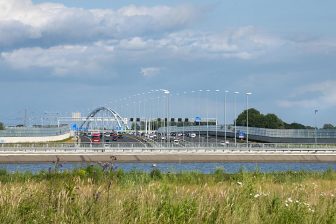Conference on Human Resources in Public Transport
5-6 March 2009, Bremen, Germany
First International Conference on Corporate Management and Human Resources in Public Transport
The change of culture in public transport
A business “by people for people”
CALL FOR PAPERS
Brussels, Belgium – In the context of sustainable mobility and corporate social responsibility, the challenge of Public Transport actors is to facilitate the mobility of citizens by providing high-quality integrated services, while balancing and conciliating environmental, social and economic aspects. Delivering high quality satisfactory mobility services implies a fundamental overhaul of the mission of public transport companies, who have to move from a production activity to a service industry. Providing customer-oriented services instead of delivering product requires a change in the corporate culture in order to better answer to the ever evolving needs of the customers. Public Transport users expect not only to be transported in the best conditions of regularity, cleanliness and security, but they are also increasingly asking for greater consideration, individual recognition and personalised services. Their satisfaction depends henceforth on customisation and relation of service.
These developments imply to rethink the mission of the staff and in particular the mission of those who are in contact with customers. The challenge is to make staff sensitive to the evolution of the environment, to training, and to encourage employees to assume more responsibility.
In these circumstances the key of management is to define and implement a corporate strategy that responds to the needs of the customers, improves efficiency and reduces costs, conciliating the interests of employees, stakeholders, shareholders, and partners.
This calls for new ways of thinking and working, new partnership, more inter-disciplinary and customer-oriented approach, creating the right conditions to foster and support staff actions and initiatives.
At this conference, we will have a comprehensive overview of innovative and original experiences and practices aimed at developing efficient management, corporate social involvement, and excellence in Human Resources management.
The conference is targeted to professionals working for an operator, authority, for representatives of trade-unions, and also for academics and consultants.
The theme of the conference is the change of culture: From a production activity to a service industry. Contributions to the conference must illustrate investments in people and processes around one of the following topics:
- Topic 1: Corporate Social Responsibility: Which choices to ensure the balance between planet, people and profit?
Concern for people, environment and society at large is directly linked to the company’s sustainability. The key to success lies in the ability of doing business at a level, on which corporate interests coincide with those of the people with whom the company works, and those of the environment within which it works.
- Topic 2: Which social responsibility for the staff and sub-contractors?
Equality, reciprocity, reliability are guiding principle of social responsibility. For partners, it means commitment to these business principles and to expect them to abide by codes of conduct comparable to the public transport company’s one. For employees, it includes integrity management with for instance a scheme whereby any staff can report suspected irregularities without fear of reprisal or recrimination.
- Topic 3: Diversity
Diversity means recognising and valuing differences in age, gender(sexual orientation, disability, ethnic origin), culture and competences. Managing diversity is about acknowledging, understanding and appreciating differences in people, whether customers or employees. Diversity refers to value, behaviours and the culture of the organisation and not just numbers and targets.
- Topic 4: Satisfaction and motivation at work and customer-orientation
A public transport company is an organisation “by people for people”. This implies creating the right conditions to foster, help and support staff actions and initiatives in improving quality of service and to enable everyone to contribute to the corporate objectives. This issue covers recruitment, training and personal development, motivation techniques, participation and profit sharing schemes, communication etc.
- Topic 5: Specific Programmes in support of young managers
Against the pyramid of age in the public transport sector and the increasing retirement rate, the sector needs to support and facilitate youth employment, ensure dynamic renewal of staff and make jobs for managers in the public transport sector more attractive. It is about empowering people to pursue careers in public transport and leadership positions in the sector.
- Topic 6: Which new technologies for better and more efficient management?
Moving from a production activity to a service industry implies new management methods and tools. The current rapid and ongoing development of new technologies present many opportunities to improve efficiency.
For each topic chosen, the Programme Committee asks the candidates to address in their abstract and presentation the following items related to results:
– increase of global income
– reduction of costs
– budget transparency
– increase of public transport traffic
– increase of journeys
– better rational use of modes by citizens (diversification of transport modes)
– results in terms of passengers’ satisfaction
Selection
The Programme Committee will endeavour to propose a geographically balanced programme when selecting speakers. It will in particular favour experiences from small and middle sized companies or towns, and from different sources: managers of public transport companies, representatives of organising authorities, policy decision-makers, manufacturers, academics, consultants, etc. in order to ensure a wide variety of approaches.
The papers will be read to an audience of transport professionals and policy officials rather than researchers. Theoretical discussions, not accompanied by practical examples will therefore be avoided, and the focus will be on assessing policies and actions of practical value for the decision-makers.
Papers must be original: texts already published or presented to the public will be accepted only if they refer to new developments. Commercial texts promoting particular products will not be accepted. Papers will be selected on the basis of the abstracts, the curriculum vitae and the experience of the candidates in addressing a large audience at world events.
Papers shall be presented in one of the following languages: English, French, German or Spanish. Simultaneous interpretation will be provided at all sessions.
UITP is pleased to announce that authors of selected papers will not have to pay the conference participation fees. They must, however, pay their own travel and accommodation expenses.
Abstracts
The abstract must be written in English and accompanied by a curriculum vitae. It cannot exceed 3,000 typed characters and must be extremely explicit about the content of the paper. More particularly the following three sections must clearly appear in the abstract:
(1) Background and objectives
(2) Implementation
(3) Results and future actions
Deadlines
- 31 May 2008
The deadline for submission is 31 May 2008 and must be met without fail. The candidates must send their abstract and curriculum vitae by post and e-mail, (faxes will not be accepted) to:
Union Internationale des Transports Publics
Knowledge and Membership Services Department Marketing Conference
Rue Sainte Marie 6
B-1080 Brussels
E-mail: agnes.peter@uitp.org
- 31July 2008
The Programme Committee will notify successful authors on 31 July 2008.
- 30 November 2008
The selected speakers must submit the complete text of their paper in one of the UITP official languages (English, French, German or Spanish) with an abstract written in English. This text as well as the enclosed abstract will have to be consistent with the last developments occurred since the redaction of the first abstract prepared for the call for paper. The deadline of 30 November 2008 must be met without fail, so that the paper and its abstract will be included in the proceedings of the conference. The speakers must specify the details of their presentation and any audio-visual equipment they would like to be placed at their disposal. Media projected on a screen must be in English.
To celebrate the 10th Anniversary of the creation of the Human Resources Commission, UITP will organise the “Change of Culture” Photo Award. The details to participate will be sent with the Official Invitation of the conference, after summer 2008.
Conference Programme Committee
The papers will be selected by the members of the Conference Programme Committee:
Co-Chair: Sylviane Delmas, Relation of Services, RATP, President of the Commission on Human Resources, and Ingrid Lieten, General Manager, De Lijn, Belgium, President of the Commission on Corporate Management
Gabriele Bonfanti, Vice-president of the Commission on Human Resources, Chief of the Human Resources, GTT, Turin, Italy
Angelo Caragiuli, Responsible for Training, Bremer Straßenbahn ag, Bremen, Gerrmany
Ralf Gottwald, Deputy Director Human Resources, Veolia transport, Nanterre, France
Isabelle Lerin Basset, Responsable Recrutement & Mobilité, Keolis, Paris, France
Yves Mathieu, Director, Missions Publiques, Paris, France
Alan McCully, Personnel Manager, Translink, Belfast, United Kingdom
Gisbert Schlotzhauer, Vorstand Personal Kommunikation und Infrastruktu, Bogestra, Böchum, Germany
Jean Dekindt, Expert, UITP, Brussels, Belgium
Cécile Sadoux, Manager, UITP, Brussels, Belgium
Who are we?
Founded in 1885, the International Union of Public Transport (UITP) is the international association of urban and regional public transport professionals, and represents all actors in that sector. The conference is organised in partnership with Wiener Linien, Public transport operator in Vienna, Austria, under the patronage of the Commission on Marketing and Product Development, which has set up a Conference Programme Committee.
U las zojuist één van de gratis premium artikelen
Onbeperkt lezen? Profiteer nu van de introductieaanbieding voor € 10,- per maand.
Bent u al abonnee?



